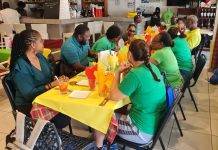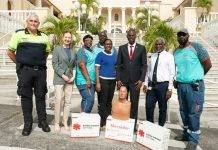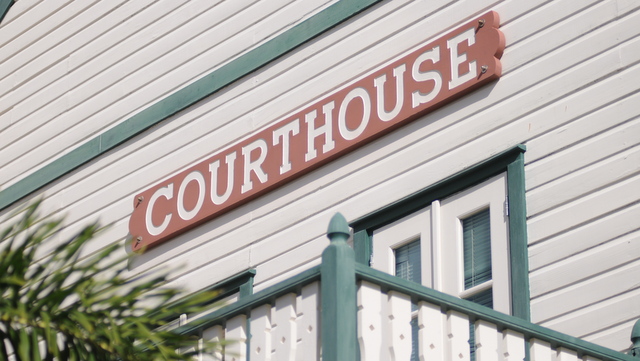Source: Today Newspaper
GREAT BAY – That the defendants in the Casablanca case did wrong is clear from the verdicts the court handed down yesterday (see related story: Light sentences in Casablanca case).
The defendants “are guilty of the exploitation of a large number of foreign women,’ the ruling states. “Due to their beggarly living conditions the women feel that they have to go and work in the prostitution industry in St. Maarten. In itself there is nothing wrong with this – legal and facilitated by the government – work. Casablanca is a legal company that is free to offer these women an opportunity to help their families but considering their extremely vulnerable position, this has to be done with extreme care.”
The court notes that it does not have the impression that Casablanca was doing all the things it has been charged with secretively. “The way of operating was acceptable according to Casablanca, but care was seriously lacking. With the objective of financial gains, Casablanca abused the women’s limited freedom of choice by exploiting them financially.”
While the court notes in its ruling that the charges justify imprisonment, it did not follow the public prosecutor’s demands against the defendants. “The court considers a large number of the charges for exploitation not proven. There was no violence, coercion of misleading. It is telling that many women came back more than once to work for Casablanca. Considering that the government has insufficiently taken its responsibility in the past for this vulnerable industry, it is not fitting to impose long prison sentences.”
About trafficking in women, the court ruled that there must be evidence of involuntariness during recruiting and transporting of women from another country to St. Maarten to make it a punishable crime. Dutch jurisprudence does no longer consider involuntariness an issue; this means that trafficking in women also applies in the Netherlands when the women agree.
The court ruled that there is insufficient evidence that Casablanca actively recruited women abroad for its brothel. Almost all statements from the 23 prostitutes investigators interviewed for this case said that they had received a tip from an acquaintance that it is possible to make a lot of money at Casablanca. The court ruled that without a clear initiative from the defendant, there is no recruitment. The court also found that Casablanca did not mislead the women into believing that they would get a job as a barmaid or a dancer.
The court considered proven that Casablanca transported the women from their countries of origin to St. Maarten. “As soon as a woman reported herself, Casablanca organized her trip to St. Maarten. Airline tickets, work permits, pick up at the airport, everything was arranged.”
And while there was no literal coercion, the court ruled that the actual circumstances of the women also play a role. “To prove “abuse”-actions it is sufficient that the perpetrator must have been aware of the victim’s relevant factual circumstances that result in prevalence and her vulnerable position.”
The court points out in its ruling that Casablanca was aware of the women’s poor living conditions and the limited options they had to earn money in their homeland. “The women have stated that considering their financial circumstances they had no other choice than to do this work at Casablanca.”
While the court found proof for transporting the women, it pointed out that this is only a punishable crime in combination with exploitation.
The court found proof that Casablanca accommodated the women with a room for which they had to pay $50 per day and that they started working at the club with a starting debt of $1,500 and sometimes more, up to $3,500.
The court acquitted Casablanca of the charge that it let the women pay for condoms. “Clients paid $50 for 20 minutes with one of the women. Of that amount, $45 was for the woman and $5 was for Casablanca to cover costs, like the price of a condom. The women did not have to pay for the condom.”
That Casablanca worked with a ticket system and that it had established a system of fines is also proven, the court ruled. Several documents show that the fine-system was quite strict. “A series of undesired behavior was threatened with significant fines,” the ruling states.
Investigators found the fine-system in writing, but no proof that fines were often imposed. It is however plausible that the women felt restricted in their behavior under the threat of fines.”
There is no evidence that Casablanca confiscated documents, like passports, from the women to bring them in a dependent position.
There is also no proof that the women were not paid their salaries. Unlike the defense attorneys, the court found that the women had a labor contract with Casablanca. In the strict sense, the brothel did not pay salaries – the women were not entitled to sick leave compensation or a vacation allowance; they were only entitled to $45 per client served. “That the women had to pay off their debt first does not mean that they received no or not enough money for their work.”
Lastly, the court took a look at the question whether Casablanca exploited the women and it concluded that the club indeed financially exploited the prostitutes. “Once they were in St. Maarten the women had no other choice than to accept bad working conditions, in particular a room they shared with someone else and where they had to live and to work, and the high rental fees. The starting debt and the ticket system placed the women in a dependent position. A different way of organizing the work could have let the women be independent. The fine-system put pressure on the women to stay in line.”
Lastly, the court ruled that the defendants benefited from the exploitation of the women by acquiring their income from it.






























